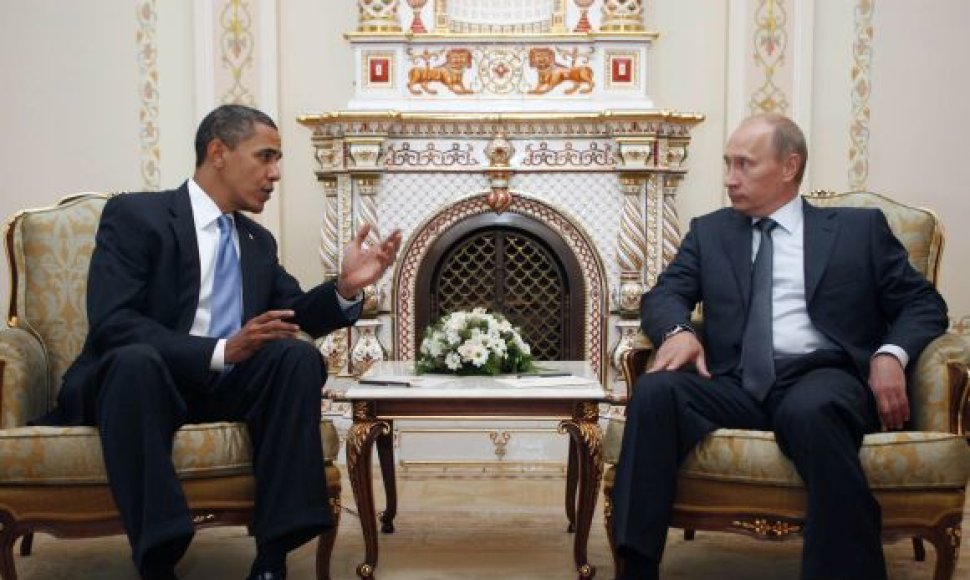He spoke in comment of the April conversation between Obama and Russia's then president Dmitry Medvedev which accidentally went on the air. Obama had said then that he would have “more flexibility” in the missile system talks after the elections, which took place early November.
"Whenever you capture a leader saying something where they think they're not being recorded, that's usually what they really think. I don't think, though, he meant he was going to appease Russia. I think it was more like he won't be so constrained in the terms of negotiations and maybe he'll be able to find terms for the treaty that are more favorable to both sides. I just think it means he'll be able to have more negotiating room," Mark, a reviewer for politico.com, told BNS in Vilnius last week.
"But I don't think it means he's gonna sell out Lithuania or Estonia or Latvia or Georgia or anything like that. I think he's still pretty strong on keeping good relations with those former Soviet republics," he added.
Speaking about relations between the future administration of the White House and the Kremlin, he said efforts would probably be made to continue on the line, which has been named “reset” during Obama's first tenure.
"I think it will be a continuation of current policy in that the US in some sense almost trying to buy off Russia so that there is no confrontation. There are a couple of areas of big concern however. One is Iran and Russia's past history of selling nuclear material to Iran. That seems to have slowed or maybe even stopped and that the Iran sanctions have really taken effect and Russia seems to be abiding by them. Also with Syria - that's a big concern because Russia is the only country that supports Assad's regime and has helped keep it in power. US has confronted Russia over this, but short of sending ground troops, which the US is not gonna do. There's not much leverage they really have. Syria is a lot closer to Russia than it is to the US, the ties are closer," Mark said.
In his words, there are a few areas where, under certain circumstances, the relations between Russia and the United States could deteriorate. One of them is possible closer ties between Iran and Russia, and the other lies in US plans to build a missile defense system in Europe. In Mark's words, the Washington-Moscow link could also be undermined by Russia's attempts “to assert itself too much over it neighbors."
"It is already influential in Ukraine and Belarus but if it starts to look like reestablishing of the old Soviet empire - that would be very worrisome for the United States, particularly over the Baltics - Lithuania, Latvia ,and Estonia - and also Georgia and some other areas," he said.
Asked about the meaning of the strategic shift in US attention to the Asia-Pacific region, the reviewer said he did not think "the US is turning away from so much (from Europe)."
"There are limited resources with the military and the Asia-Pacific region is seen as the most urgent need. Particularly because of China and the need to contain China. And that's why you see US troops going over to Australia, the Philippines, and other areas like that. The US government is very careful not to say, they don't say openly that containing China is the reason for doing that, but clearly that's a big part of it," he said.
"But relations between the US and Europe are still strong. Just in a different way, you don't have the large amount of ground troops like you had in the days of the Soviet Union when there was a concern about the invasion from the East. Instead, the ties are more economic in nature and trade ties between the US and the European Union - but also the US and individual European countries - are pretty strong," Mark said.
In his words, the US-Europe connection can be called an old friendship that nobody has to worry about.
"Even though President Obama has not yet visited, I believe State Secretary Hillary Clinton has been here twice in addition to John McCain and other prominent politicians. I still think it's very much on US "radar" screen," the US reviewer told BNS.
In Mark's words, defense funding in the US is currently a very important topic, but reduction of military spending should not affect joint exercises with other countries.
"As far as foreign countries go, I don't think there's so much willingness to pull back on joint exercises. In fact, if anything, I see joint training exercises with other countries receiving more military aid because that is often seen as more effective than writing a check to other countries because sometimes that gets mismanaged," he added.
Mark said that Lithuania's defense budget, which is nearly the smallest among all NATO member-states, should not become the reason for Washington's change of opinion about Vilnius and national security policy objectives.
"I don't think Washington looks down on Lithuania in that sense. I think there's an understanding of the needs. I think in some ways there's actually a respect to what Lithuania has done with it's austerity program. The fact is that it has actually cut its government spending in a way that many other places have not, including the United States for that matter. So I don't think that's necessarily a problem actually with Washington," Mark noted.












